Anatomy of an Era: Final Chapter/ ATTENTION/FEEDBACK/PERSONAL TOUCHES
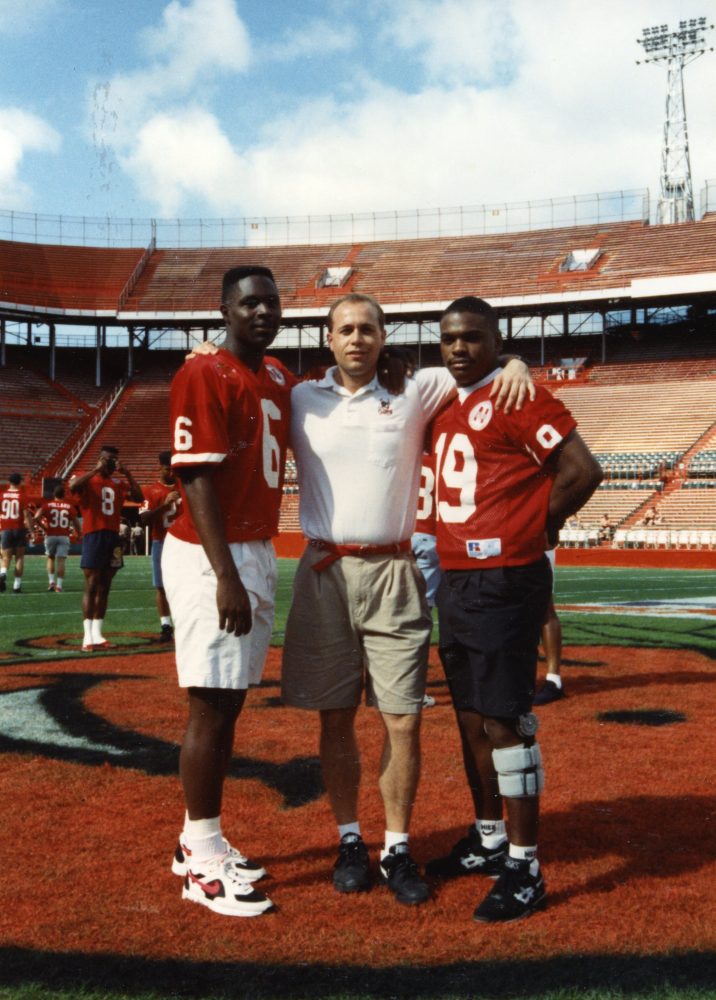
Excerpted from Chapter 104, No Place Like Nebraska: Anatomy of an Era, Vol. 2 by Paul Koch
Anatomy of an Era: Final Chapter/ ATTENTION/FEEDBACK/PERSONAL TOUCHES
Speaking of communication flowing up and down the hierarchy of the organization, what cemented player/coach relationships and bonded them as one were the various instances and ways the staff showed caring & concern for each of the student-athletes, revealing how each individual held great value regardless of performance or even rank on the depth chart…
We also really tried to focus on how the kids interacted with coaches and how to give them feedback, what the likes and dislikes were, and how the kids reacted to the feedback that the coaches gave them. And I got really close to the other coaches, too, and spent a lot of time just knowing how to give the players feedback, how they worked together, and how to better share the feedback, too… and the players really benefited from all of that. – Jack Stark
…we got maximum effort out of players because they felt that they were important, that we cared about them as people. We were certainly interested in winning football games, but were even more concerned with their general welfare… one of the greatest needs people have is to feel understood. Even though you may not be able to fix the problem, if a player felt that I at least tried to understand him, understood where he was coming from, it made a difference. It seemed to fire them up to play to the best of their ability… we certainly tried to put players first and let them know that whether they were a first team player or fourth team player, that we cared about them as individuals. And I guess you show that in various ways. I tried to spend some time down in the weight room every day after practice and I talked to five or six guys, maybe for three or four minutes each. And by the end of the season I’d talked to most everybody several times and knew a little bit about their family, what was going on academically, wouldn’t let them play if they didn’t perform academically, let them know their education was placed above football, that their health was important… I think by showing concern in various ways by listening to them and getting to know them personally, that they felt cared for. And I think that was important. And I think that when the coaches care about you that you’re a little more apt to care about the program, about other players. And so I think that overall the chemistry really came together very well. – Tom Osborne
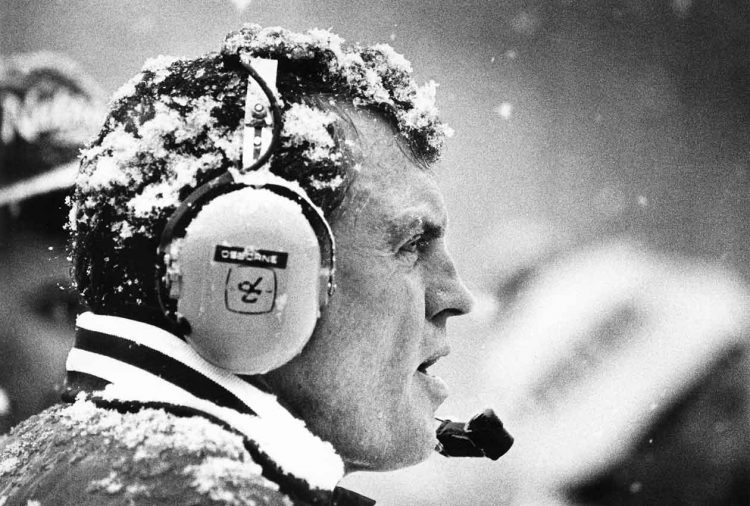
Case in point…
(Coach Osborne) was thorough. He knew you by name the first day you were there and he would call you by name. And the amount of players that were under him, with the walk-ons and the scholarship players? I just thought it was very neat that he could remember everybody’s name pretty much; he’d acknowledge you as he walked by you, and that would assure you that you weren’t just a number. – Damon Schmadeke
Coach Osborne was out in the middle of the field and called me over- right in the middle of practice. And he said, “Gerald, you’ve been doing a lot of good things and there’s some real potential for you to get some playing time, so I want to you to be ready.” And man, you talk about a boost in confidence… That was so much better than him pulling me in the office and saying that. And just like you said, there was so much going on, and he took the time to make that point to me. I’ll never forget that little thirty second conversation. That was awesome… – Gerald Armstrong
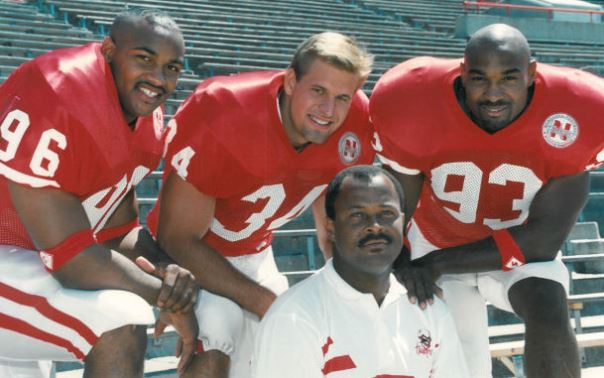
Coach Tony Samuel with David White, Trev Alberts and Travis Hill
Sometimes it was simply an individual staff member’s initiative, and not just an organizational dictate…
Whether it was something the coaches encouraged or what, that‘s just the way it was. I don’t remember how that all developed, but it was rare. I think it was just a matter of looking around a little more, instead of just my position. And it might just be a couple words to a guy, sometimes that’s all it takes is sharing a couple words here and there with a guy. It wasn’t anything fancy where we sat down and created all these fancy speeches for the guys… I always talked to all the fellas. I always saw myself as a guy who liked to (notice) the freshman or guys struggling and tried to get them to see different things and give them a couple words of encouragement to keep going.
– Tony Samuel
…there was not a time that (Tom Osborne) didn’t make time for somebody else. And I thought, ‘If he can do it, why can’t I do it?’ I was grateful to be a part of that family and carry his message to the players. – Bryan Bailey
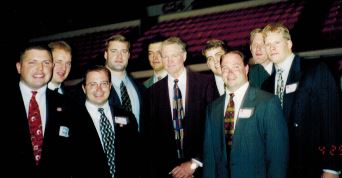
The Schmadeke twins book-ending Tom Osborne (Spring Football Banquet ’94)
The youngsters appreciated the attention immensely…
I remember Coach Darlington always used to talk to Coach Brown, “Are you mad at him? What did he do? He’s tearing us up down here!” That used to make me feel good. Even if it’s not coming from my own coach, somebody is seeing the work that I’m doing and how seriously I took it. I may not have been in any of the magazines and this or that, but my teammates and other coaches saw my effort and that made me feel really good. – Jacques Allen
… as kids we were always, “Prove it to me.” I remember a number of times when coaches would pull you aside and talk about life, “How are you doing? Can you improve in this? How is your family situation? How’s your mom? How’s your dad? Is there anything I can do as a coach to help you out and improve things, whatever they may be?“ And it was not only on the practice field, but off the field as well. – Aaron Davis
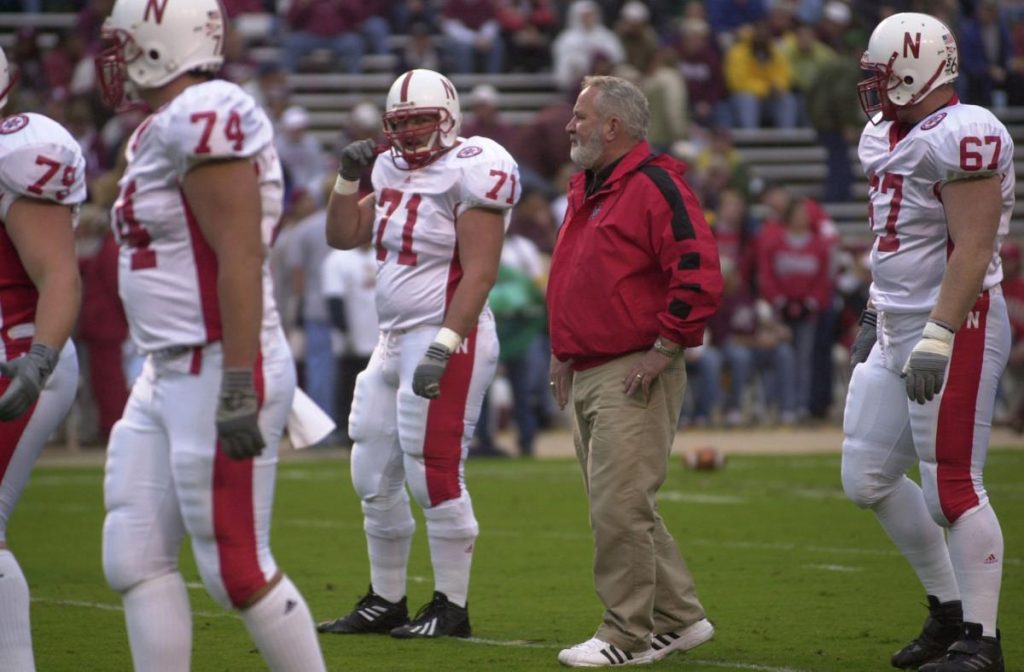
The hay’s in the barn…
I remember I got benched my senior year and I got put on scout team… and kind of pouted. And Coach Tenopir came up to me and says something like, “Is that what you’re going to do now? Are you going to be a big pussy?” And I remember that was on a Monday or Tuesday, and that kind of snapped me out of it. I really appreciated him doing that, because I was so down… That really lit a fire under my ass and it really pissed me off, and I decided to bust my ass and win the job back. I’m thankful for him. He was always really nice to me and I’m thankful he was a hard ass to me that time. – Tom Seiler
(Osborne) really had an amazing ability to adapt and really get to know each individual player on a personal basis. And I’ll say this, he would really take pride in studying the new freshman coming in and getting to know them as they moved up the ladder of the team and knowing everybody by first name. And out of all the coaches: Darlington, Brown, Steele, all those guys, my nickname in college was “Schmad.” But Coach Osborne was about the only coach who could differentiate my name between myself and my twin brother’s, Damon, and he always called me ‘Darren.’ He always called me by my first name. He had an amazing ability to really get to know people by first name.
– Darren Schmadeke
Even when it wasn’t directed at them personally…
When (Osborne) talked to you -because he wasn’t very animated or anything like that- when he talked to you it was really special. To have him take time out and talk to you and see how you were doing -and he’d do that for everybody, every kid- it was so amazing to me. I remember when I’d been there for a few years and I looked over and he was talking to the brand new freshman, a walk-on kicker, a kid who never had a scholarship, a kid who was probably never going to get a scholarship. And he was talking to the kid. He knew the kid’s mom and he knew the kid’s dad, he knew them by name, “How is your mom Carol? And how is your dad…?” And I was like, ‘Wow!’ I realized, ‘You’ll never have another head coach like that, who cares that much about the kids and what he’s doing.’ – Larry Townsend
(Coach Osborne) would acknowledge everybody, every single one of us, every time, everywhere… It didn’t matter if you were Billy Bob Anybody, he treated everyone the same. – John Livingston
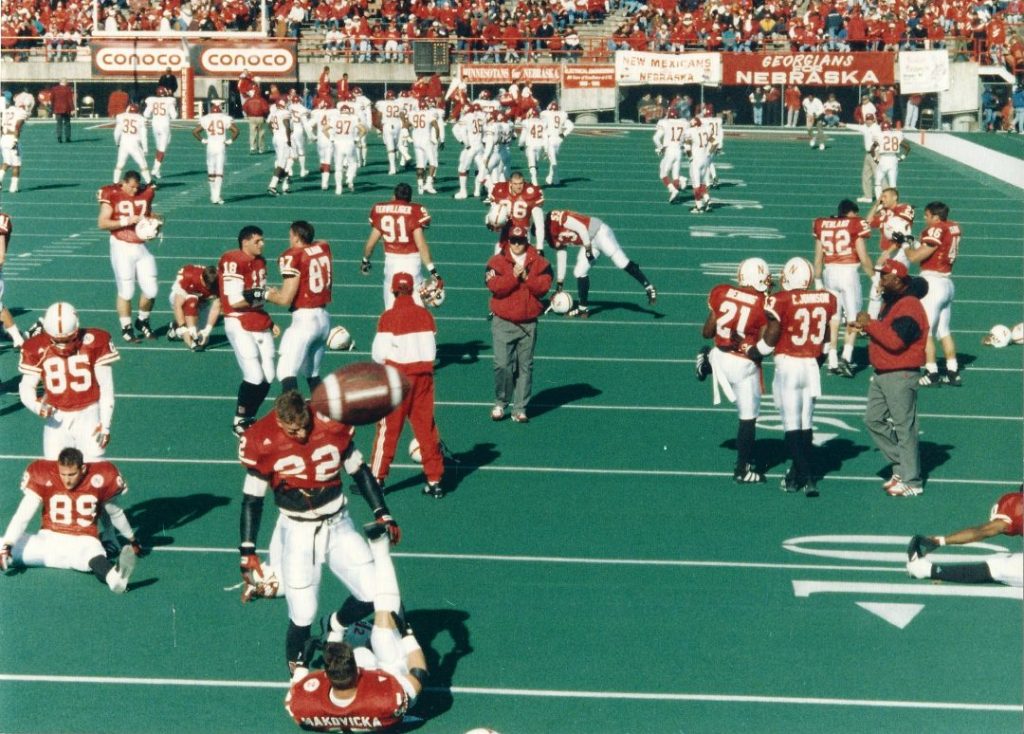
Chad Stanley strolls the Husker phalanx
Performance-based feedback was key to those many interactions…
The most frustrating thing is guessing where you’re at. But Charlie always let you know… – Bill Humphrey
…that was one thing that was pretty neat. Every single play, whether it’s handing the ball off, throwing the ball, they’d grade you on every single thing. And of course, you’d get your grade and compare it to yourself that day and against the other quarterbacks. – Ben Rutz
…we went on a three point grade. One point meant you were in the right place and made the right steps. Two, you maybe blocked your man and you kept him out of the play. Three was, I think, not only did you block the man, but then you got downfield and created a second block or did something beyond that. I think that’s how that worked. I don’t recall exactly. Zero would mean you absolutely screwed it up. – Bill Humphrey
…there was 1 point for the mental aspect of the game, “Did you do your assignment correctly?” There was one point for the physical part, “Did you execute the block as determined?” And that was it. A 2 point grading scale. If you didn’t do any of them you got a zero, if you knew where you were going but didn’t get there you got a one, if you did them both well you got a two. That’s how it went. Then you have an average. And an average for the game was a 1.98, something close to that. Then (Tenopir would) tally pancakes in another column. Those were a separate monster. – Matt Vrzal
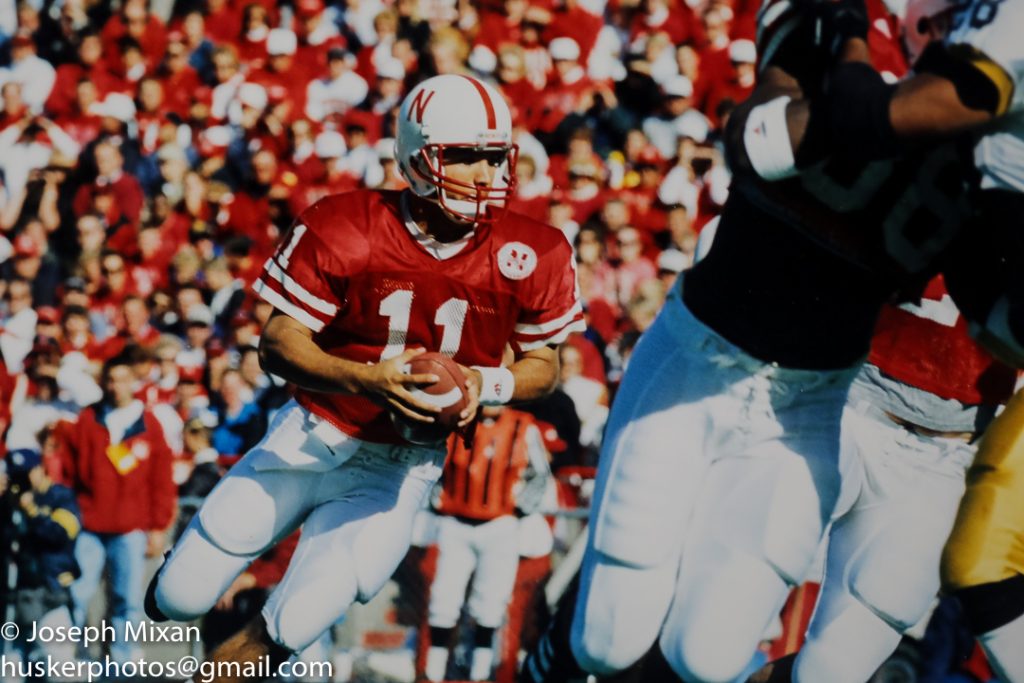
Matt Turman: Follow that Pipeline…
Special awards were another form of feedback, a public recognition of efforts…
Coach would recognize Players Of The Game, they’d put little plaques in the hallway from the locker room to the training room down there, and there was the Scout Team Players Of The Week Award, too, and the plaque on the wall there. – Adam Treu
The thing I remember the most about Coach Osborne was he always told me how much he appreciated my effort. Him and Coach McBride and Coach Darlington would always tell me, “We could give you the Scout Team plaque every week.” I took a lot of pride in that… Them saying that they could give me that Scout Team Award every week, that meant a lot. – Jacques Allen
I moved to scout team quarterback to help the team and I remember I was 4-time Scout Team Player of the Week because I just got out there and busted my ass to help out as scout team quarterback. That was probably my best accomplishment. For me to get that award 4 times in an 11 game season, that was something. – Ryan Held
I got the Unsung Hero Award. It’s a big, giant trophy that I have. I always made an impact, but behind the scenes. – Lance Gray
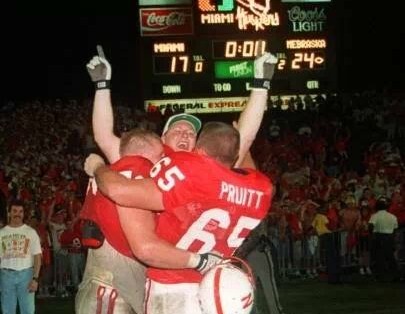
Pruitt, Wilks & Caskey celebrate victory
The constant and varied feedback via video helped immensely, too…
I think the real good time to learn was both by watching yourself and watching other guys in the film review session after every game and every practice. Everything you did the day before, you really learned a lot by watching. You’d find out what everyone did right and wrong… It was cool learning about yourself through other people, so I think that was a vital part for the guys who didn’t even really like it. It was a huge part of player development… – Matt Shaw
…we’re in the film room with running routes and blocking assignments and making the right reads. It limits your mistakes. That was something good. I can’t watch football, to this day, without grading players on the field… You’d know if you were improving because you started to limit your mistakes and you began to know everything that you was supposed to do. If you made bad grades you knew something was wrong. – Corey Dixon
The daily film sessions, correcting things that needed correcting. We’d watch all the practices on film and take notes and talk through issues if there was any of that, about certain plays. By the end of the week we’d have a test that Milt and Dan would give us for that week’s opponent. – Adam Treu
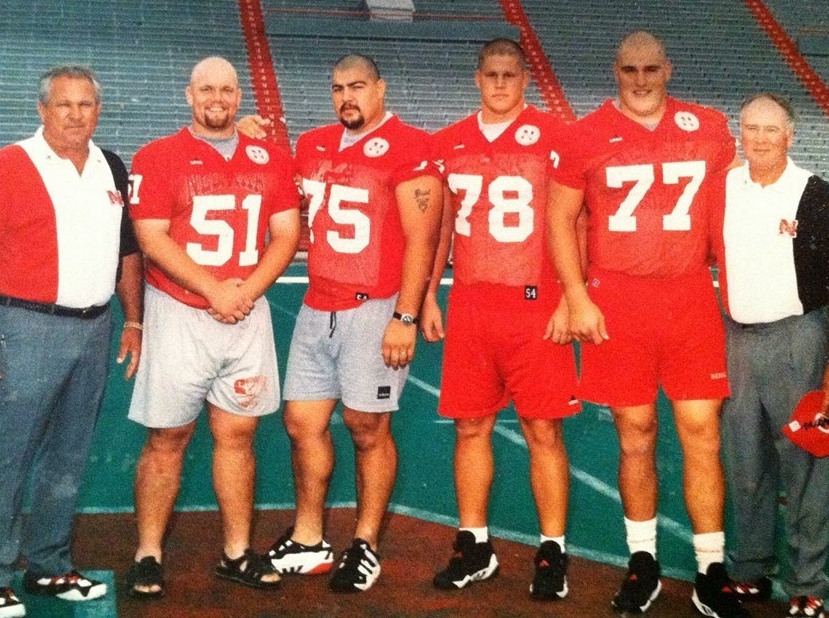
M. Tenopir, Matt Vrzal,Chris Dishman, Kory Mikos, Adam Treu & D.Young
The use of videotape brought about accountability…
… after the (first) practice we go upstairs, and it’s the varsity coaches -even though we’re freshman- and they flip on the damn film! I was, ‘Oh, no! They film practice?!! Are you shitting me?!’ And we’re on film, we’re all out there loping and screwing around… and that was the wake up call.”They film practices?!” That was the ‘Coming to Jesus’ moment for us all… that was probably the most profound moment was when they sat us down and turned those practice tapes on. It was the first day… all of a sudden you’re out there and they’re filming warmups, they’re filming stretching, they’re filming practice… – Lance Gray
The student-athletes grew in their grasp of greater self-worth as a result of the short, one-on-one, personal interactions, or ‘touches’ by the coaches. They didn’t get the impression they were merely being used as a means to an end, as a tool for a coaching staff’s self-aggrandizement or a steppingstone to garnering a better contract or a big raise. Knowing the stereotypical scenario was not the case in this particular instance, what resulted was an outpouring of respect, reverence, and gratitude that was, in turn, exhibited by greater player dedication, efforts and, ultimately, victories. The constant attention and feedback kept the players moving forward in a proactive, achievement-oriented mindset rather than shutting down into a protective, hesitant, untrusting frame of being.
Copyright @ 2013 Thermopylae Press. All Rights Reserved.
Photo Credits : Unknown Original Sources/Updates Welcomed
Author assumes no responsibility for interviewee errors or misstatements of fact.
Summary Chapter to be continued…..